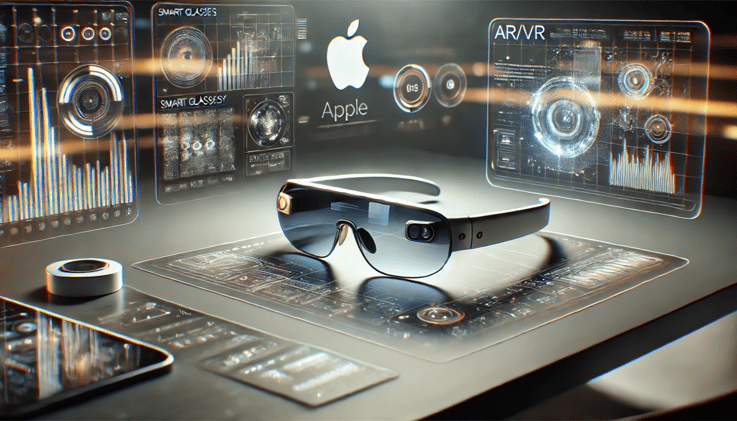
Image Source: ChatGPT-4
Apple has reportedly begun exploring smart glasses as part of its push into augmented and virtual reality.
According to a recent report by Bloomberg, Apple launched an internal study codenamed "Atlas" last week, inviting select employees to provide feedback on smart glasses concepts. This employee-driven approach aligns with Apple’s typical strategy of gathering feedback within the company to maintain confidentiality.
Growing Momentum for Smart Glasses
The concept of smart glasses has been gaining traction in recent years, with various tech companies investing heavily in augmented reality (AR) and virtual reality (VR) technology. The growing demand for more accessible and user-friendly AR devices has prompted Apple to explore this new frontier.
Feedback Focused on Smart Glasses:
An internal email to employees noted Apple’s focus on "testing and developing products that all can come to love," hinting at the potential for a user-friendly AR device beyond the Vision Pro. The emphasis on employee feedback suggests that Apple is committed to creating a product that meets the needs of its customers.
The Vision Pro, released in 2023, marked Apple’s entry into the AR market with a high-end headset priced at $3,499. However, the company appears motivated to deliver a lighter, more accessible AR experience with its future smart glasses. The focus on user-friendliness and affordability is likely driven by the success of Meta’s partnership with Ray-Ban, which offers a simpler and more affordable smart glasses model.
The Competition:
Meta’s partnership with Ray-Ban has set the stage for a new wave of smart glasses that prioritize accessibility over advanced features. Unlike the Vision Pro, these Ray-Ban glasses feature basic functions like music streaming and hands-free calling without AR displays. Apple appears to be targeting this market with its future smart glasses, aiming to deliver a more accessible and user-friendly experience.
Industry Shifts and Competitive Insights
Meta’s "Orion" project, which incorporates micro LED projectors for on-glass displays, demonstrates the growing appeal of lightweight, wearable AR tech. While Orion is still in development, it highlights the industry’s drive toward compact and affordable devices—an area Apple is likely to target with its future smart glasses.
The success of Meta’s partnership with Ray-Ban has paved the way for other companies to explore more affordable and accessible AR options. As the demand for wearable AR tech continues to grow, Apple is well-positioned to capitalize on this trend with its future smart glasses.
Looking Ahead:
Although Apple’s smart glasses are likely years away from market, "Atlas" underscores the company’s commitment to wearable AR tech. In the meantime, Apple is focused on refining its Vision Pro with more affordable options and a second-generation device.
If successful, Apple’s smart glasses could bring AR technology to a wider audience, signaling a shift toward accessible, everyday wearable tech. The potential for Apple’s smart glasses to democratize access to AR tech has significant implications for various industries, including education, healthcare, and entertainment.
The Future of Smart Glasses:
Apple’s entry into the smart glasses market is likely to be met with excitement from consumers and investors alike. However, it also raises questions about the company’s ability to deliver a user-friendly and affordable product that meets the needs of its customers.
As Apple continues to explore the possibilities of wearable AR tech, one thing is clear: the future of smart glasses holds tremendous potential for innovation and growth. With its focus on accessibility, affordability, and user-friendliness, Apple is well-positioned to lead the charge in this exciting new frontier.
Conclusion:
Apple’s "Atlas" study signals a significant shift in the company’s focus toward wearable AR tech. As the demand for more accessible and user-friendly AR devices continues to grow, Apple is poised to capitalize on this trend with its future smart glasses.
The success of Meta’s partnership with Ray-Ban has set the stage for a new wave of smart glasses that prioritize accessibility over advanced features. With its focus on delivering a user-friendly and affordable product, Apple is well-positioned to lead the charge in this exciting new frontier.
As we look ahead to the future of smart glasses, one thing is clear: the possibilities are endless, and the potential for innovation and growth is tremendous.







